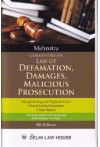- Author(s): Mehrotra B.N, S.K.P Sriniwas, Gunjan Rekhi
- Publisher: Delhi Law House
- Edition: 8 Ed 2024
- ISBN 13 978938918350
- Approx. Pages 1246 + Contents
- Format Hardbound
- Approx. Product Size 24 x 16 cms
- Delivery Time Normally 7-9 working days
- Shipping Charge Extra (see Shopping Cart)
.........................................................................................................................
Description
Alongwith Especial Emphasis Upon
* Social Media Defamation
* Hate Speech
Pre - Trial Media Publications and Parliamentary Privileges
Jurist Blackstone has indicted that every man is entitled to have his reputation preserved inviolate". Reputation depends upon opinion and opinion is the main basis of communication of thoughts and information amongst humans. So far so, reputation is nothing but enjoyment of good opinion on part of others. Thus, the right to have reputation involves right to have reputation intact or inviolate. Next to life, what man cares most is reputation. Defamation means the offence of injuring a person's character, fame or reputation by false and malicious statements. The term seems to be comprehensive of both libel and slander. Defamation now has become a burning issue due to growing media frenzy, which has been created over the freedom of speech and expression as envisaged under Article 19(1)(a) of the Constitution of India. Winfield opines that defamation is the publication of statement which tends to lower a person in the estimation of right thinking members of society, generally or which tends to make shun and avoid that person. As per Salmond the wrong of defamation lies in the publication of a false and defamatory statement about another person without lawful justification. The Faulks committee in England in year 1975, observed that defamation shall consist of the publication to a third party of matter which in all the circumstances would be likely to affect a person adversely in the estimation of reasonable people generally. Odger in his book "Defamation" has stated that no man may disparage or destroy the reputation of another. Every man has a right to have his good name maintained unimpaired. This right is a jus in rem, a right absolute and good against all the world. Words which produce in any given case, appreciable injury to the reputation of another are called defamatory and defamatory words if false are actionable.
.........................................................................................................................
Table of Contents
Part - I : Law Relating to Defamation
Chapter
I. Introduction
II. Defamation - Generally
III. Defamation - The Global Perspectives
IV. Mass Media and Global Defamatioin Laws
V. Reynolds Privilege and Common Law Defamation
VI. Publication
VII. Malice
VIII. Justification
IX. Privilege Absolute
X. Qualified Privilege
XI. Fair Comment
XII. Cyber Defamatiion
XIII. Procedure and Prosecution
XIV. Damages
XV. Application for Judicial Review - Damages in
Part - II : Law Relating to Malicious Prosecution
I. Principle Governing Malicious Prosecution
II. Proof
III. Prosecution
IV. Want of Reasonable and Probable cause and Malice
V. Damages in Malicious Prosecution
VI. Vicarious Liabillity
Part - III : Law Relating to Contempt of Court
I. Introduction
II. Concept and Genesis of Contempt of Court
III. Contempt of Court Generally
Part - IV : Pre-Trial Medial Publications
I. Freedom of Expression and Contempt - Due Process to Protect Liberty
II. Media Publications if Pre Judicial
III. Mandrid Principles and Pre-Trial Publications
IV. Prejudicial Publications After Arrest
V. Arrest for Serious Offences - Effect of 24 Hour Rule
Part - V : Parliamentary Privileges Breach and Contempt of
I. Freedom of Speech in Parliament
II. Preliminary Priviles - Positiion in India
Appendix
1. Lord Cambell's Libel Act, 1843
2. Defamation Act, 1952
3. Fox's Libel Act, 1792
4. The Parliamentary Papers Act, 1840
5. The Libel Act, 1845
6. The Newspaper Libel and Regstration Act, 1881
7. The Law of Libel Amendment Act, 1881
8. The Slander of Woman Act, 1891
9. Indian Penal Code, 1860
10. The Parliamentary Procedure (Protection of Publication) Act, 1956
11. Criminal Procedure Code, 1973
12. Contempt of Courts Act, 1971
13. The Criminal Libel Act, 1891
14. Judicial Proceddings (Regulation of Report) Act, 1926
15. The Newspaper, Printers and Reading Room Repeal Act, 1869
16. False Imprisonment, Suit for Compensation
17. Stamp Duties on Newspapers Act, 1836
18. Law Reform (Married Women and Tortfeasors) Act, 1935
19. Limitation Act, 1963
20. Wireless Telegrapy Act, 1949
21. Representation of the People Act, 1951
22. Representation of the People Act, 1949
23. Constitution of India
24. Model Forms
Index
.........................................................................................................................
Author Details
B.N. Mehrotra
Gunjan Rekhi
S.K.P. Sriniwas

